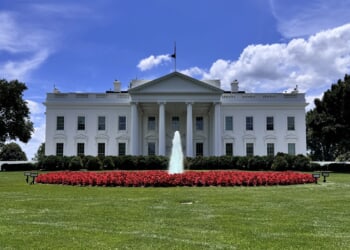Crazy days! In the spirit of positive thinking the last century’s New Dealers used to say, Happy days are here again! These are nervous days — boom or bust! But I say, with Iris De Ment, “let the mystery be,” we’ll find out soon enough. At least let the new boys give it the old college try before declaring them hits or flops. Free men and free markets, the watchword at TAS. Have a little faith, lads, and carry on.
The recent sources of the liberation movement … of the Sahel can be located in the ill-conceived Anglo-French intervention in Libya.
Reports from abroad suggest we, as Americans, are getting a bad rep. My question is: who’s talking? Euroweenies? Russian thirdromemystics? Chinese middlekingdomandarins? Who needs them? We have Africa on our side. Every conceivable strategic mineral, precious stone, energy resource, tropical fruit, subtropical vegetable, and the fastest-growing youngest eagerest population on earth, a market made to order for the Great Commercial Republic, where a man’s handshake is the only contract you need, “Let’s you and me make some money.” Not by grift, not by con, and not from benevolence toward our fellow man. Brain and brawn! And a good accountant.
Consider the countries in the middle of the Sahel, the poverty-stricken stretch of savanna and desert from Senegal on the Atlantic to Sudan and the Red Sea. Landlocked Mali, Burkina Faso, and Niger, left ECOWAS (Economic Community of West African States, the mutual support club of West Africa) to form their own bloc, AES (Sahel States Alliance), and promptly imposed a tariff, .05 percent, on imports while declaring their common citizenship. Their goal? Africa for Africans! Economic liberation!
Tired of others — gallant French Legionnaires and the best of ours at U.S. Africa Command — doing their policing, they asked us with polite firmness to leave, thank you, they could fight their own fights, in this case against the jihad and extortion gangs who hide in the Saharan dunes and swoop down on rural villagers, like the banditos in The Magnificent Seven.
They are tired of handouts and vertical commerce, the devil’s bargain that developed in the post-independence decades. Like most of the other Eurocolonies of Africa, the Sahelians were cut loose but found themselves stuck with trade regimens that fixed prices for their exports, cocoa, coffee, gold, uranium and more — much besides.
You could make the case that they were not ready for independence and the structures gave them an opportunity to become “tigers” to use the phrase applied to east Asian countries like South Korea. Korea was in fact much poorer than most of Africa and it had to recover from a devastating war of resistance against international communism. You could say they got used to governance by serial coup d’etat, as demonstrated in the Sahel over the past five years.
Too, you might consider the French, the power most involved in the Sahel, was well into reforming its trade relations. But memories of unfair relations outweigh even visible change, in fact change inflames old sores.
That’s human nature. And as a rule putschists, tasting power, want to keep it. There are reports that, unsurprisingly, this spells repression of peaceful opposition, troubling “disappearances” of journalists, censorship. The AES juntas are getting military assistance from Russia, an infrastructure deal from China, and those things do not come for free. The Russians are, to put it kindly, offering protection rackets in exchange for concessions in metals and minerals. The Chinese are focused on what they can bring home, or squirrel away for future use, which observers fear is also the logic behind their investments in American farmland.
An alliance between the U.S. and the fledgling AES would make an impact on all Africa (notwithstanding vast differences across the continent). The mighty and the tiny, what a great team. The Sahelians have endured hard times, enslavement, desertification to rival our dust bowl, wars and revolts and tribal divisions. Surely we can feel an affinity, and their music is great, too.
American ideals, like jazz and rock an’ roll, continue to have a contagiously exhilarating influence even in the most remotes places. Now would be the time to bring back the Voice of America’s Africa service, whose music programs as well as its hard news, in the best American tradition of fair-and-accurate, remain hugely popular in Africa.
In both the U.S. and the Sahel, there evidently are enough people to make a difference who believe that being masters of their fate begins with security and economic liberation. Sahelians believe they have been shortchanged by the world trade system that U.S. president Donald Trump want to blow up or render more fair, which means finding prices seller and buyer agree to.
It may be these are delusions promoted by demagogues or economic illiterates; but even if this is so, there exists an opportunity to offer them better deals they have got so far for their products, which include the minerals, strategic and precious, that we believe we need.
The Trump administration is promoting reinvestment in American manufacturing, but at the comparative scales we are talking about, it would scarcely be noticed if while raising capital for a motorcycle factory in Indiana or a tractor factory in Illinois investors factored in shops with the same tools in Burkina Faso or Niger.
Now of course we are talking about economies of entirely different scales. GDP for the AES is estimated at under sixty billion dollars, half New Mexico’s. The fledgling AES numbers about 70 million people, half the Sahel, but this is projected to double by 2050. Which is worth bearing in mind if you intend to find export markets once you have fixed your domestic ones with your own revived product-producing economy.
The recent sources of the liberation movement — if such it is — of the Sahel can be located in the ill-conceived Anglo-French intervention in Libya, in which the U.S. led from behind. It had the unintended consequence of opening the regions to the south, namely the Sahel, to jihadists. The hottest spot now may be Burkina Faso. A U.S. Defense Department research institute reports that the intensity of jihadist/bandit attacks in Burkina Faso has reached a point where the government’s authority is flouted outside the capital of Ouagadougou.
Burkina’s junta is led by a young captain, Ibrahim Traore, who is enjoying a run of support across the region and beyond, in the African diaspora. It is not possible to gauge support inside the country, any more than inside Mali or Niger, because none of the juntas has been tested in a free and fair. Traore advocates for self-sufficiency and pan-Africanism; the AES, with its tariff wall, would be the way to square that particular circle, maybe accompanied, as happens when liberation falls short, by repression and censorship.
Their p.r. suggests they are engaged in a fundamental task, ending the neo-colonial regimes that kept them in bondage by means of shadow governments in the form of gray eminences behind the nominal high officials, armed interventions by foreign legionnaires when they got out of line, and one-sided, vertical commercial agreements designed to provide France with cheap energy, raw materials, gold and other metals, and dark money.
In Burkina, the putschists compare themselves to Thomas Sankara, a putschist of the 1980s who initiated land reforms and improvements in health services (including vaccination drives) and education (for girls as well as boys, which was new). He espoused anti-Western allegedly socialist and communist ideas because he viewed colonialism as a product of capitalism. He irritated the French and our own Africa hands who feared the example his small and weak country might set. He replaced the French-given name of the country, Upper Volta, with the one its inhabitants traditionally used, Burkina Faso, which means Land of the Upright.
After four or five years in power, Sankara was overthrown and killed in a putsch led by another soldier, whom Sankara considered a brother. His legend began then, and his enduring popularity across West Africa (and beyond) rests on his bold, righteous, charismatic manner, his principled anti-imperialism which he convinced his supporters would return to Africans the self-reliant and communitarian societies they believed, and often still believe, existed before colonialism.
If there is legend in this, that among other things obscures the resort to repressive methods to stay in power, it still has currency: Burkina says it will share what it has with African countries shocked by recent cutoff’s of U.S. food aid.
There is quite a lot of goodwill toward America in Africa, and private economic engagement as well as some of our foreign policy instruments can keep it so. The tools are there — Voice of America to compete with the anti-freedom propaganda, re-named USAID programs consisting in health and humanitarian resources (seed grants instead of massive dependency-fostering handouts) to underscore that giving and getting are inseparable axioms of our moral code, training and advisory missions under AFRICOM, which since it began in the early ’00s have proven to be cost-efficient ways to improve security without enmeshing us in conflicts.
That’s the challenge; whether we ought to take it up is another matter.
READ MORE from Roger Kaplan:


![NYC Tourist Helicopter Falls into Hudson River, Siemens Executive and Family Among Those Killed [WATCH]](https://www.right2024.com/wp-content/uploads/2025/04/NYC-Tourist-Helicopter-Falls-into-Hudson-River-Siemens-Executive-and-350x250.jpg)






![Green Day’s Cringe Trump Diss Ends in Fire and Evacuation [WATCH]](https://www.right2024.com/wp-content/uploads/2025/04/Green-Days-Cringe-Trump-Diss-Ends-in-Fire-and-Evacuation-350x250.jpg)
![Red Sox Fan Makes the ‘Catch of the Day’ with Unconventional ‘Glove’ [WATCH]](https://www.right2024.com/wp-content/uploads/2025/04/Red-Sox-Fan-Makes-the-‘Catch-of-the-Day-with-350x250.jpg)
![Bikini Clad Spring Breakers Prove Our Education System is Failing Students [WATCH]](https://www.right2024.com/wp-content/uploads/2025/03/Bikini-Clad-Spring-Breakers-Prove-Our-Education-System-is-Failing-350x250.jpg)





